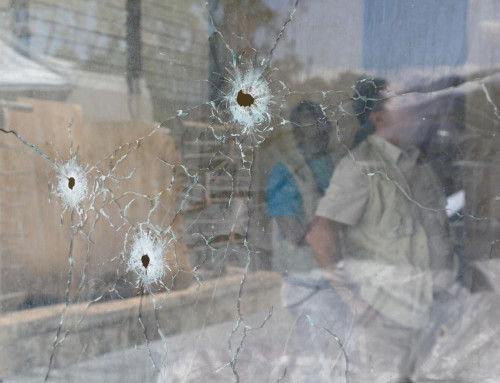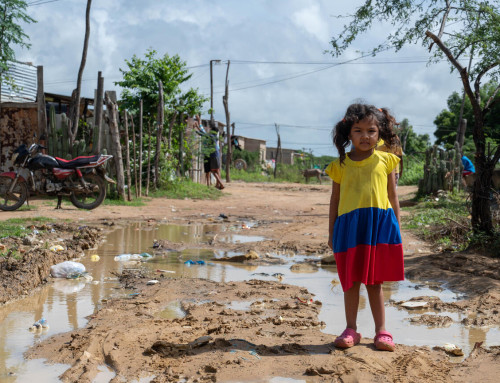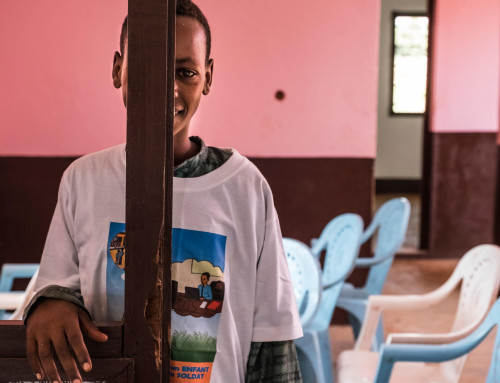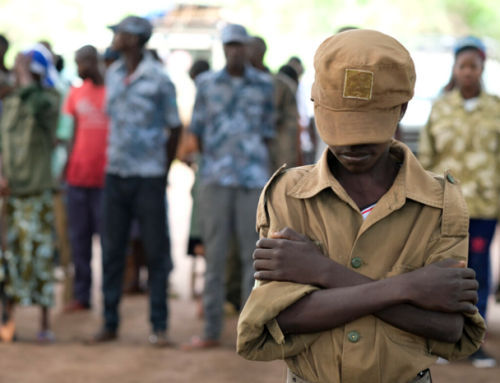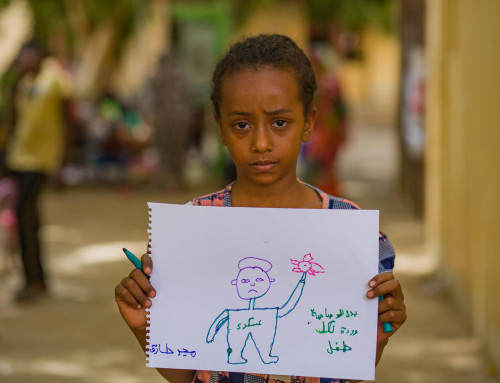Nature of conflict is changing, as children increasingly targeted report says
NEW YORK, 17 October 2007 – Dozens of conflicts around the world are still robbing children of their childhood, according to a new UN report that reviews progress since the groundbreaking 1996 study on children in armed conflict by Ms. Graça Machel.
The report, by the Special Representative of the UN Secretary General for Children and Armed Conflict and UNICEF, highlights the changing and devastating impact of conflicts on children. It notes that advances have been made in protecting children from war crimes such as unlawful recruitment by armed forces and groups and sexual violence. It also urges the international community to take concrete actions to stop abuses of children in armed conflict.
"The international community has been very active in developing a solid legal protection framework," said Ms. Radhika Coomaraswamy, Special Representative of the UN Secretary General for Children and Armed Conflict. "But much more must be done to ensure compliance, to fight impunity and to address all violations against children."
Over the past decade, conflict has impacted children more brutally than ever. They are victims of strikes against schools and of abductions aimed at forcing them to serve as combatants, sex slaves or servants. And in conflict zones their vulnerability is often greatly increased because violence claims their first line of defense – their parents.
"Threats to children caught in conflict are increasing," said UNICEF Executive Director Ann M. Veneman. "They are no longer just caught in the crossfire. They are increasingly the intended targets of violence, abuse and exploitation, victims of myriad armed groups that prey on civilians."
But the damage that war wreaks on children's lives is not limited to attacks by combatants. Malnutrition, disease, displacement and poverty also threaten them.
The report urges all UN member states to fulfill their responsibilities to children, by providing them with access to basic services like education, health, nutrition, water and sanitation. "The needs of children must be prioritized before, during and after conflict. They must be part of all peace-making and peace-building processes," said Ms. Coomaraswamy.
Other key recommendations include a call to end impunity for those responsible for heinous crimes against children. This means ensuring prosecution of war crimes and adherence to relevant international norms, many of which have been established since the original Machel study was published.
Ten years ago the original landmark Machel study alerted the world to the brutal realities faced by children recruited by armed groups and on the use of sexual violence as a weapon of war.
This new report notes progress in preventing the recruitment of children as well as in demobilizing them and aiding their reintegration into society. Concerted This new report notes progress in preventing the recruitment of children as well as in demobilizing international action has also led to advancements in combating sexual violence.
Some important achievements in this regard are the first prosecutions by international tribunals, the commitment of the Security Council to monitor and address the issues and the adoption of new international laws and standards. These include Optional Protocol of the Convention of the Rights of the Child on the Involvement of Children in Armed Conflict and the Paris Principles to prevent the unlawful recruitment and use of children.
However helping children recover from the trauma caused by their experiences and ensuring their long term reintegration into their communities remains a considerable challenge.
This follow-up strategic review offers concrete recommendations for the next decade, including a call for member states and civil society to safeguard children living in the more-than-50 conflict zones around the world, as well as those struggling in post-conflict settings.
***
Background Information:
To read the full text of the 1996 study by Ms. Graça Machel titled "The Impact of Armed Conflict on Children," the 2007 Machel Strategic Review Report, as well as the children's report, " Will you listen? Young Voices from Conflict Zones." please visit: http://www.un.org/children/conflict/machel/
Attention Broadcasters: Broadcast-quality video and audio reports available free of charge at www.thenewsmarket.com/unicef
Note to the editors:
A series of events are planned around the Machel Strategic Review on 17 October at the United Nations in New York. A press conference with Ms. Radhika Coomaraswamy, Special Representative of the UN Secretary General for Children and Armed Conflict; a UNICEF representative and Ishmael Beah, former child soldier and best-selling author of "A Long Way Gone," will be held following the Noon Briefing in Room 226 at the UN Secretariat. From 13:30 to 14:30 at the UN Conference Room One, children from countries affected by conflict will be presenting their report "Will you listen? Young Voices from Conflict Zones." From 15:00 to 18:00 in UN Conference Room One, the Machel Strategic Review report will be presented to the Third Committee of the General Assembly. Ishmael Beah will also address the Third Committee.
About UNICEF
UNICEF is on the ground in over 150 countries and territories to help children survive and thrive, from early childhood through adolescence. The world's largest provider of vaccines for developing countries, UNICEF supports child health and nutrition, good water and sanitation, quality basic education for all boys and girls, and the protection of children from violence, exploitation, and AIDS. UNICEF is funded entirely by the voluntary contributions of individuals, businesses, foundations and governments.
About the Office of the Special Representative of the Secretary-General for Children and Armed Conflict
In 1993, the General Assembly adopted a resolution recommending that the Secretary-General appoint an independent expert to study the impact of armed conflict on children. Ms. Radhika Coomaraswamy is the second Special Representative of the Secretary-General for Children and Armed Conflict, assuming the position in April 2006. The Special Representative serves as a moral voice and independent advocate for the protection and well-being of boys and girls affected by armed conflict. Over the past year, she has visited Cote d'Ivoire, Democratic Republic of the Congo, Occupied Palestinian Territories, Lebanon and Israel. To learn more about the SRSG's work, please visit: www.un.org/children/conflict
For more information please contact
Laurence Gerard, SRSG on Children in Armed Conflict, + 212 963 0984, gerardl@un.org Kate Donovan, UNICEF NY, +212 326 7452, kdonovan@unicef.org

